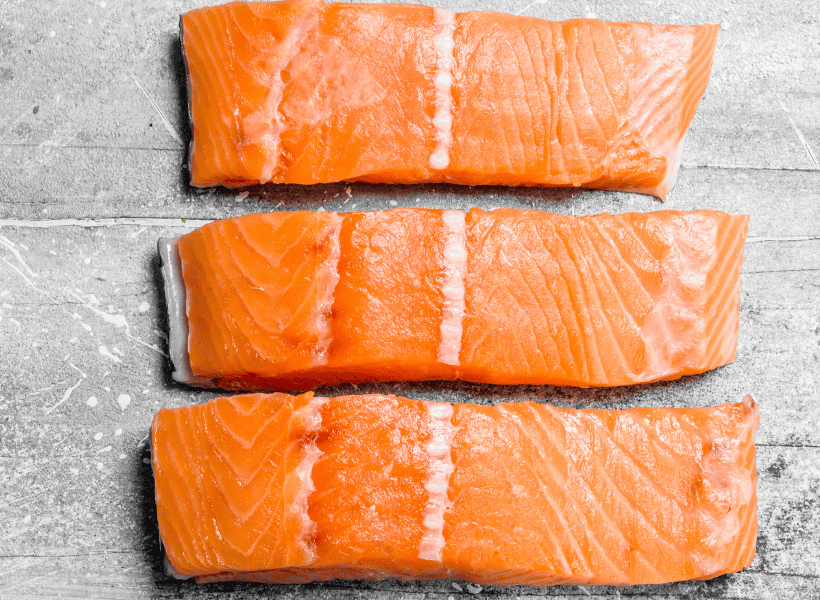Does your raw fish have a fishy smell? How do you know if your cooked fish smells ok or not? How long can you store cooked fish? Like other meats, eating spoiled fish can lead to some pretty bad symptoms and conditions, so it’s not something to risk. We have all the answers for you in this article.
How to Tell if Cooked Fish is Bad
The very best way to determine if your fish is bad is smell it. Since you’re unable to gauge it the same way you do raw fish, the smell of the fish is best test. Of course, fish will smell like fish, but the smell gets much stronger as the expiration date or freshness expires.
Cooked fish will not have a slimy feel to it the way raw fish does when it goes bad.
The most common traits of bad fish are a pungent fishy odor, or sour smell or rancid smell. When in doubt, don’t risk it, just throw it out.
How Long Can Cooked Fish Last in the Fridge?
According to food safety guidelines published by the United States Department of Agriculture, “ Cooked fish and other seafood can be safely stored in the refrigerator 3 to 4 days. Refrigeration slows but does not prevent bacterial growth.“
Store leftover cooked fish in an airtight container in the coldest part of your fridge.

How Long Can Uncooked Fish Last Before Cooking?
Typically, fresh fish can be safely stored in the fridge for 2-3 days. Keep in mind, you don’t know how long it was in the store’s refrigerator. Always keep an eye on the “use by date”.
If you’re unable to cook your fish at least by the “use by date” on packaging, you may want to consider freezing it.
What’s the best way to freeze fish?
To freeze it the proper way to prevent freezer burn, you’ll want to wrap it in plastic wrap, making sure the plastic is touching all areas of the fish, squeezing out any extra air.

28 Day Carb Cycling Meal Plan: 1200-1500 Calories
Looking to get fit and healthy while still enjoying your favorite foods? Look no further than Fit Found Me’s carb cycling meal plan!
Our meal plan is designed to help you achieve your fitness goals by strategically cycling your carbohydrate intake, resulting in increased fat burning and energy levels. Plus, with our delicious and satisfying meals, you’ll never feel like you’re sacrificing taste for health.
Whether you’re a seasoned athlete or just starting your fitness journey, our meal plan is perfect for anyone looking to get in shape and feel great. With a wide variety of meals to choose from, you’ll never get bored and will always be on track towards your goals.
So why wait? Join the thousands of satisfied customers who have achieved their dream bodies with Fit Found Me’s carb cycling meal plan. Order now and start seeing results today!
See FULL description BELOW
Tips for Buying the Fresh Fish
When you’re selecting the best quality raw fish from the grocery store or fish market there are things you can look that’ll ensure you get top quality fish every time:
- Smell: The way fish smells is one of the most important indications to its freshness. It may seem natural that fish should have a “fish smell.” But that is actually a sign that your fish, whether you’re buying a whole fish or fish fillets, are passing their prime. Good quality raw fish should have a neutral or almost cucumber-like smell.
- Check the eyes: If you’re buying a whole fish, look at the eyes. Fresh fish will have moist, plump and clear eyes. If the eyes have clouded and appear dried out, that is a sure sign the fish is not at its freshest and should be avoided.
- Skin: When you’re looking at the fish, the skin should be shiny, and the scales should be closely fitted together. If the skin is dry or has a dull color and the scales are flakey, that is a sign of age.
- Texture: You may not always have the option to feel the fish before buy it. But if you can, then look for fish that feels firms to the touch. It should easily bounce back when you press on it. A mushy and slimy texture is a sign that fish has started to age.
How to Store Fresh Fish
If you are purchasing multiple things at the grocery store, wait to pick up the fish right before checking out. You’ll want to take your fish straight home and get it in the fridge as soon as you can. Store seafood or fish fillets wrapped in butcher paper or a plastic bag, then place it in a shallow covered container to prevent it from leaking on to the shelves in the fridge.
Once you’ve wrapped it, slip it down into a freezer bag or wrap it in a layer of freezer paper. For best results, you’ll want to eat it within 6 months of freezing.

What’s the Best Way to Thaw Frozen Fish
For thawing frozen fish, just place it in the fridge overnight. You can also do a quick thaw by placing the frozen fish submerged in cool to cold water. If it’s not thawed within 30 minutes, change out the water with fresh cool water. Fish thaws quickly this way so don’t leave it out too long.
Fish should never be thawed at room temperature because warmer temps could cause bacterial growth.
It’s important to understand the shelf life of fish before purchasing it. As a good rule of thumb, you should cook it the day you buy it. But if you have refrigerated fish, the absolute maximum you can keep it before cooking or freezing is 1-2 days. While it can be expensive to have to throw it away after a couple of days, it’s a much better alternative to risking food poisoning.
What Happens if you Eat Fish That’s Spoiled?
Fish that has not been stored properly, cooked within the recommended guidelines, or eaten within a day or two can contain harmful bacteria that can cause a health risk. There are two type main types of food poisoning caused from fish:
Scombroid poisoning: This is a histamine toxicity caused by eating spoiled fish or as a result of poor food handling practices. Symptoms are upset stomach including abdominal pain and nausea, rash, headaches, burning of the mouth and dizziness. These symptoms may be mild to severe and can last from a few hours to a couple of days.
Ciguatera poisoning: This is most frequently reported seafood-toxin illness in the world and is caused by caused by eating reef fish that’s contaminated with certain toxins. Symptoms of ciguatera can be mild to severe. Most often gastrointestinal issues like nausea and upset stomach occurs but determining on how much of the toxins were ingested, there could even be cardiovascular abnormalities that occur including slow heart rate and low blood pressure.
Is Eating Fish Heathy?
Incorporating fish into your regular meal rotation is a great idea. Omega-3 fatty acids in fish are directly link to eye, brain and cardiovascular health! Because our bodies are incapable of making omega-3 fatty acids, we have to get it from the foods we eat, and fish is a great source.
Salmon has higher levels than some other types of fish. We are huge salmon fans in our home and include it as often as we can. If you love salmon, you should try Orange Glazed Salmon, Pistachio Crusted Salmon or this Lemon Dill Salmon.
Other fish high in omega-3 fatty acids are sardines, trout, herring, cod, mackerel and tuna.



